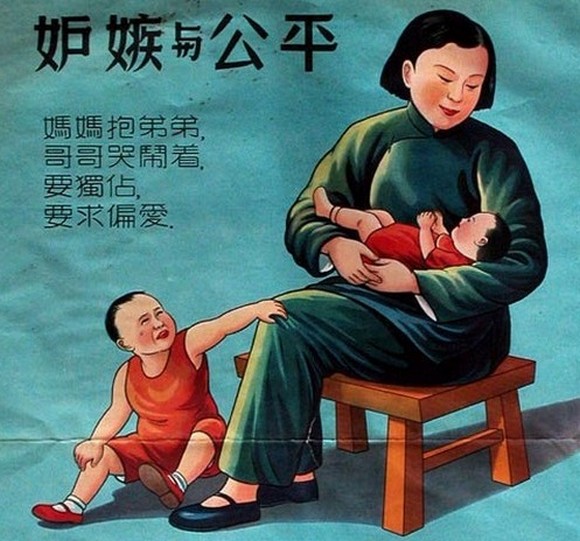
When the word “education” pops up, most of the time, the first thing that comes to mind is education for children. While parents and adults in general are often concerned about educating our future leaders, we tend to forget that parents need education too because, unfortunately, parenting skills do not come as a bonus with the birth of a baby.
A set of parenting posters produced in Shanghai in 1952 reveals some golden words that were given to parents of that time. Time and technology may have changed the way parents and children interact these days, but these 62-year-old parenting tips are surprisingly relevant even today.
▲ Emotional Development: Parents’ Love
Don’t overindulge your children with love, but don’t hesitate to love them either.
Without love, they tend to become short-tempered;
punishment and scoldings are not education.
With adequate love and care, a child will have a healthy body and mind,
just as the rain and sun are vital for a plant to grow and blossom.
▲ Compassion and Love
Only in a mother’s embrace can a baby gain the most precious sense of security.
Encourage children to love animals and to show them compassion, that will in turn cultivate their emotions.
▲ Nurturing Imagination
Children have boundless imagination, and they sometimes make up stories.
A three-year-old child may say, “I have a big airplane at home,” but does that constitute as a lie? That was not his intention.
Drawing can help him express his imagination.
Building blocks are constructive in helping him materialize his fantasies.
▲ Courage and Fear
No yelling and crying at every cut or bruise, teach them to be courageous from a tender age.
Don’t encourage the fear of climbing to high places or walking on narrow planks,
don’t allow them to cringe at effort and labor,
don’t let them fear the dark.
▲ Jealousy and Fairness
When mum carries the younger brother, the elder brother throws a tantrum, demanding attention and favoritism.
Dad dotes on his son and daughter equally, never favoring one over the other.
If one slices the watermelon, make sure it is sliced equally.
After that, put the other in-charge of distributing the slices.
That makes things fair for all, and prevents the cultivation of jealousy.
▲ Curiosity is Not Destruction
Sometimes children don’t mean to destroy things,
they’re just curious to know how something looks like when it’s torn or broken.
What’s the best way to show them?
Give them a substitute object, let them satisfy their curiosity.
▲ Questions About Birth
“Mama, where did little brother come from?”
“Mama, where did I come from?”
These questions provide the best opportunity for sex education.
Don’t make up stories and lie to your children.
Instead, use kittens, puppies or baby chicks as examples to explain the facts about reproduction.
▲ Questions About Death
Children may be afraid of dead people, they may also ask you about death.
You can lay out the facts in a context they are capable of understanding.
For example, plants will wilt, and birds will die too. Death is what ceases living.
Over the past 62 years, many things may have changed, and parenting trends have come and gone, but the strong values embedded in these parenting tips have not gone out of date because we’re still humans after all. If you know a new parent around you figuring out the ways of parenting, be sure to share these golden words of advice with them!
Source/Images: Baidu